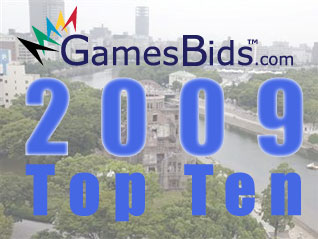Rio has the map of the world.
The first time I saw it was in Denver earlier this year at an international sports conference where the 2016 Olympic bid cities were presenting. During Rio’s presentation the map was revealed to all, the audience applauded – some even cheered.
The presenter of the map, Rio 2016 President Carlos Nuzman said “that was the first time that I saw a big applause from the audience for a map.”
Admittedly, it was a first for me too.

But this isn’t an ordinary map. It is a very powerful map; it has dots on it. These dots are scattered all across the map, but the special part of the map is where no dots are placed – South America.
Coincidently, no Olympic games have ever been hosted in South America either.
It was so successful that Rio brought the map back during a presentation to IOC members in Lausanne in June. There was more applause. The map was a hit!
While the Rio roadshow continued, the map traveled along. It likely appeared as the star of presentations right around the world.
Finally it was the big day – the final presentation to the International Olympic Committee in Copenhagen for the Rio 2016 bid. Everything was on the line.
Rio’s rival Chicago presented first. They had the most powerful man in the world, the President of the United States – and more importantly, they had his wife starring in their presentation. They talked about sponsorships, a beautiful waterfront, a compact plan and a history of accomplishments.
But Rio had the map.
Now it was Rio’s turn. Everyone in the room watched intently, wondering if the map would appear. The anticipation was agonizing.
Finally, 7 minutes and 20 seconds into the presentation the map was revealed. it was beautiful. The audience reacted with an unmistakeable murmur.
Some of the members of the media were non-believers; they quipped “oh there they go with that map again.”
The blue oceans and green continents were perfectly tinted. The names of former Olympic host cities resolved nicely in their places across the map. And, as a nice touch, the Rio 2016 logo appeared in the bare spot over South America.
The map did its job and Rio was very proud.
Then Rio’s most powerful speaker, President Luiz Incio Lula da Silva, took the podium. He was empassioned, inspiring and convincing. Many say that he highlighted the presentation but others will tell you that he spoke well because he was talking about the map.
Tokyo was next. They had a plan for the Games in the center of the city. They had 4 billion dollars in the bank to fund it. They had a wonderful legacy from the 1964 Olympics to leverage.
But Rio had the map.
Madrid delivered the final presentation of the day. They bid for the last Games so they’ve had lots of practice and would probably do well. They had the King of Spain and the “Games with the human touch”. Most importantly they had 89 year old former IOC President Juan Antonio Samaranch who told the IOC members, many of whom were elected under his leadership, that his days were numbered and he’d really appreciate it if they selected his country to host the Games again – please.
But Rio had the map.
It was now time to vote. Rio was confident because they knew that IOC President Jacques Rogge was determined to send the Games to new frontiers – he wanted to put a dot on South America or Africa. Since there was no African bid it could only be South America this time.
First ballot – Chicago out. The United States has the most dots on their map, 8.
Second ballot – Tokyo out. Tokyo already has a dot, where would the second one go?
Final ballot – Sorry Juan Antonio Samaranch, the map, um… Rio wins!
In a convincing way, the International Olympic Committee has used the power of the map to send the Games to Rio de Janiero. That consumed the map’s power and the legend of the map has ended.
The bid teams of the four cities have been working for as many as four years, creating plans, developing strategies, traveling the world. There were thousands of volunteers and hundreds of millions of dollars were spent.
But Rio had the map.
I hear there is another map – one without a dot on Africa.
Rob Livingstone is the producer of GamesBids.com and has been closely following the Olympic bid process for 20 years. He will be blogging through the final days before the election on October 2.
Rob will bring you first-hand observations from the scene in Copenhagen.




